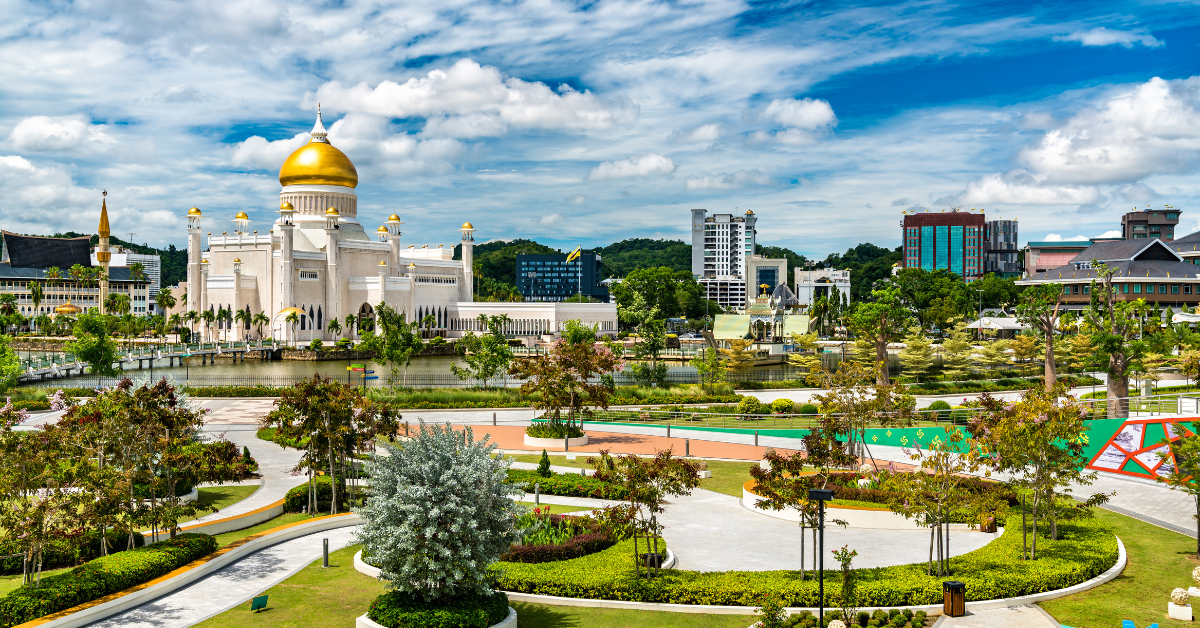Brunei is a small yet wealthy nation located in Southeast Asia. In Japan, it is usually written in katakana, while in Chinese it appears as 文莱. For Japanese people, the country is relatively unknown, but its rich natural resources, peaceful society, and unique culture create a distinctive image.
The Chinese Character Notation of Brunei
The official name of Brunei is “Brunei Darussalam,” meaning “the Abode of Peace.” In Japanese, it is generally written in katakana, and Chinese character notation has not become established. This is largely because diplomatic, economic, and cultural exchanges with Japan have been limited, and thus there was little necessity to adopt a kanji form.
In Chinese, however, the country is written as 文莱, based on sound transliteration. This is not meant to carry meaning but rather to approximate the pronunciation, reflecting the naming custom in Chinese-speaking regions.
| Notation | Region of Use | Notes |
|---|---|---|
| ブルネイ (Brunei) | Japan | Most commonly used |
| ブルネイ・ダルサラーム国 (Brunei Darussalam) | Japan | Official name |
| 文莱 (Wénlái) | Chinese-speaking regions | Based on phonetic transliteration |
In summary, katakana notation is standard in Japan, while phonetic kanji notation is used in Chinese-speaking regions.
The Image Japanese People Have of Brunei
Since Brunei does not frequently appear in Japanese media, general knowledge about it is limited. Still, images are formed based on resources, social systems, tourism, and culture.
Economic Prosperity from Resources
Brunei is rich in oil and natural gas, and resource exports form the backbone of its national economy. As a result, citizens enjoy a high standard of living, with free healthcare and education, making its welfare system highly developed. Among Japanese people, the strongest perception is that of “a wealthy and stable nation sustained by resources.”
| Aspect | Content | Japanese Perception |
|---|---|---|
| Resources | Oil and natural gas | Wealthy country |
| Welfare | Free healthcare and education | Stable living |
| Income | High national income | Prosperous image |
Calm and Polite National Character
Islam is the state religion of Brunei, and religious discipline shapes daily life. As such, people are seen as polite and lead calm, orderly lives. Japanese people often view Brunei as “safe, with gentle and peaceful citizens.”
Unique Tourist Destination
Brunei is not widely recognized as a tourist destination, but it holds distinctive attractions. Kampong Ayer, the world’s largest water village, and the grand Omar Ali Saifuddien Mosque are highlights. Because of such features, travelers often describe Brunei as a “hidden gem or mysterious destination.”
| Tourist Spot | Features | Japanese Evaluation |
|---|---|---|
| Kampong Ayer | Largest water village in the world | Exotic and attractive |
| Omar Ali Saifuddien Mosque | Golden dome | Luxurious and spiritual |
| Jungle tourism | Untouched rainforest | Image of a hidden paradise |
Brunei Through the Lens of Sports
Sports play a significant role in international exchange and national identity, and Brunei also participates in this aspect.
The Presence of Football
Although Brunei’s national football team is not a global powerhouse, it participates in regional competitions, and football is popular domestically. The image of “a small nation that continues to challenge itself” resonates positively with Japanese sports fans.
Martial Arts and Traditional Practices
Brunei is known for the traditional martial art Silat, which is actively practiced and showcased in international competitions. Japanese martial arts such as judo and karate are also popular, and through sports, cultural ties between Brunei and Japan are growing.
Sports and International Exchange
Through sports events, Brunei strengthens ties with other nations and raises its international profile. Beyond football and martial arts, athletics and swimming are also pursued. This contributes to the image of Brunei as “a nation that strives to be an active member of the global community.”
| Sport | Status | Japanese Perception |
|---|---|---|
| Football | Participates in regional tournaments | A small country that keeps challenging |
| Silat | Widely practiced traditional martial art | Seen as culturally fascinating |
| Martial arts | Judo and karate are popular | Connection with Japan |
Organizing the Japanese Image of Brunei
The image of Brunei among Japanese people is multifaceted. Its perception is shaped by economic, social, cultural, and athletic elements.
| Aspect | Japanese Image |
|---|---|
| Economy | Resource-rich and prosperous |
| Society | Safe and peaceful |
| Tourism | Hidden gem with unique charm |
| Sports | Small but determined, connected internationally |
Conclusion
Brunei does not have an established Chinese character notation in Japanese, and katakana is generally used. In Chinese, it is written as 文莱, but in Japan, adopting kanji was never necessary and thus did not spread.
For Japanese people, Brunei represents a prosperous nation sustained by resources, a society with a calm and polite population, a mysterious yet attractive tourist destination, and a small country engaged in sports and international exchange. As tourism and athletic exchanges continue to grow, Brunei will likely move from being seen as a “distant small nation” to becoming “a familiar and appealing country.”






